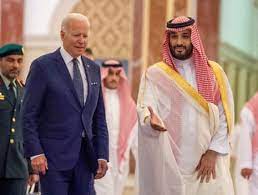Recent U.S. efforts to normalize relations between Saudi Arabia and Israel have faltered following the October 7 attack, complicating the ability to meet Saudi Arabia’s demands. The U.S. has played a significant role in the Middle East for decades which have often resulted in the opposite, creating societal divisions, arming conflicting groups, and making the region more chaotic and dangerous.
It is high time for the U.S. to step back and retrench within its own borders. Its imperial overstretch has led to its own decline, and it now lacks the capability to protect its Middle Eastern allies and even the Americans living there. The U.S. is now in competition with other powers expanding their influence in the Middle East like China who has brokered a peace deal between Saudi Arabia and Iran, the Russia-led BRICS has established connections with many middle east countries, and India’s transit corridors are making significant inroads in the region.
Momentum toward Israeli-Saudi normalization halted after Hamas’ October 7 attack on Israel. U.S. and Saudi diplomats suggest they are close to reaching bilateral agreements as part of a broader normalization deal, which is far from true as US is stepping back from an extremely close relationship with the Saudis. As achieving such a deal would essentially require Washington to offer significant incentives to Riyadh. This pursuit raises questions about U.S. priorities amid ongoing regional tensions.
The Saudis seek formal U.S. security guarantees, support for developing a civilian nuclear program, and access to advanced computer chips for AI technology. This Saudi interest in Israeli concessions for a two-state solution raises skepticism, as Riyadh, once staunchly demanding a two-state solution, now appears willing to negotiate for its own benefits. Riyadh is now considering a “plan B” option, which could potentially sideline the Palestinian cause altogether, further complicating the region’s dynamics.
The U.S. is also facing heightened geopolitical competition with other major players. Beijing has successfully brokered a détente between Saudi Arabia and Iran, showcasing China’s growing influence in the region. Additionally, Riyadh’s decision to join the Russian-led BRICS bloc signals a significant shift in its alliances, moving closer to powers that are traditionally seen as competitors to the U.S. Moreover, Saudi Arabia is a major partner of India, which has actively worked to secure the Red Sea from Houthi attacks on crucial shipping routes. These developments indicate a multi-polar power structure emerging in the Middle East, diminishing U.S. dominance.
Washington’s continued involvement in the region will only stretches its military and economic resources. A re-evaluation of U.S. foreign policy priorities is necessary to adapt to the changing global landscape and to ensure that American actions are aligned with its long-term strategic interests.
The U.S.’s military-dominated posture in the Middle East has consistently failed to provide education and social development to the region’s people. Currently, around 40,000 U.S. military personnel are stationed in the Middle East, with troops in Iraq and Syria being particularly vulnerable to attacks from the Axis of Resistance. A deadly attack on a U.S. outpost along the Jordan-Syria border this year underscores this vulnerability. The continued presence of U.S. troops serves little purpose and poses an unacceptable risk of escalation and further entanglement in regional conflicts, which US cannot afford.
The financial costs and risks associated with defending Saudi Arabia under a normalization deal are much higher than what the U.S. can reasonably afford. Entering such agreements obligates the U.S. to commit resources and military support in ways that may not align with its strategic interests. Additionally, the U.S. practically cannot expect other nations to consistently align their foreign policy decisions with American interests, especially when those interests’ conflict with their own.
The complexity and inherent risks of such an agreement highlight the urgent need for a re-evaluation of U.S. capabilities and strategies in the region. It is imperative for the U.S. to reconsider its approach and acknowledge the limitations of its influence and effectiveness in the Middle East. This re-evaluation should prioritize withdrawing from unsustainable commitments and focusing on diplomatic and humanitarian efforts that can genuinely foster long-term stability and development in the region.
